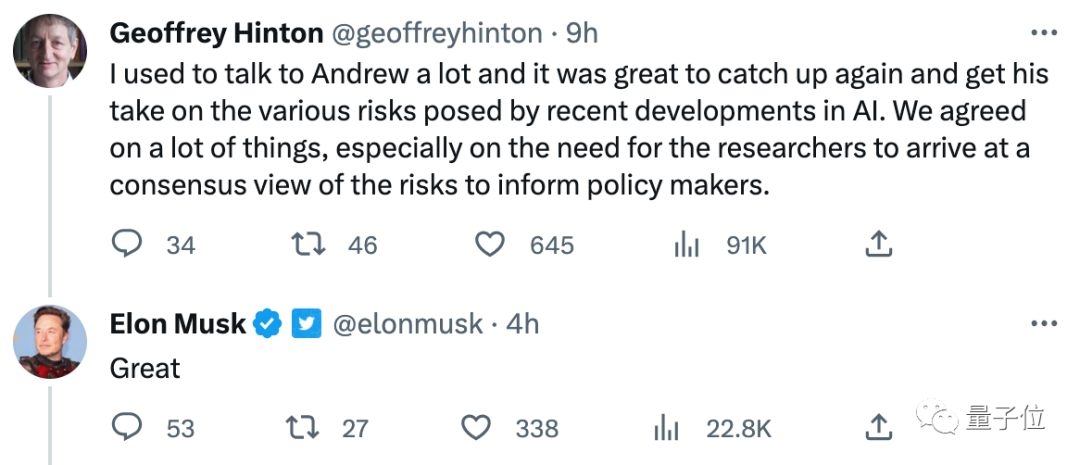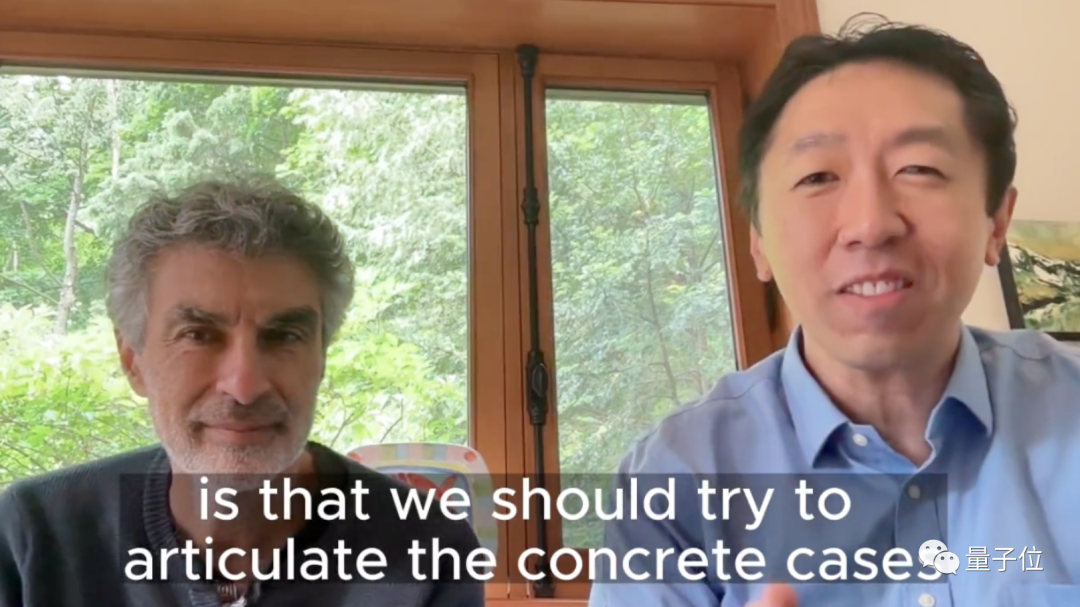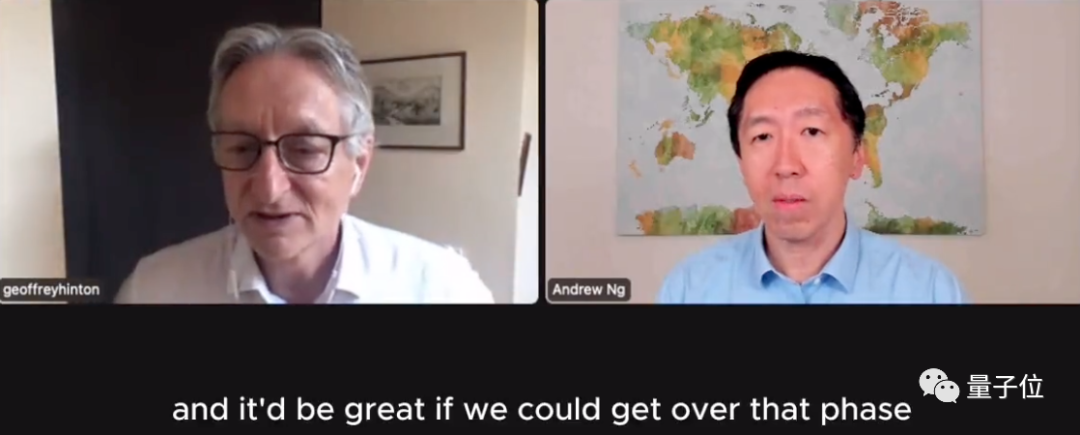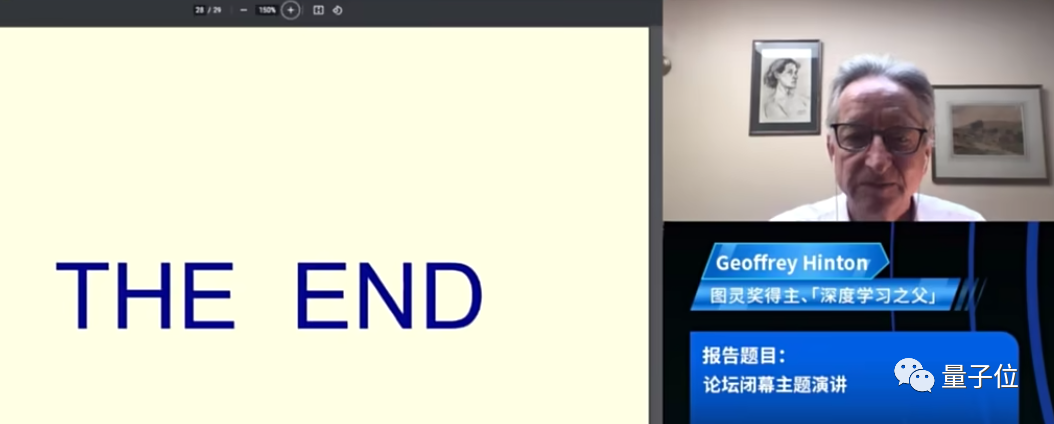 Technology peripherals
Technology peripherals
 AI
AI
 Hinton, Turing Award winner: I am old, I leave it to you to control AI that is smarter than humans
Hinton, Turing Award winner: I am old, I leave it to you to control AI that is smarter than humans
Hinton, Turing Award winner: I am old, I leave it to you to control AI that is smarter than humans
Do you still remember that the experts were divided into two camps on "whether AI may exterminate mankind"?
Because he does not understand why "AI will cause risks", Ng Enda recently started a dialogue series to talk to two Turing Award winners:
Does AI exist? What are the risks?

Interestingly, after having in-depth conversations with Yoshua Bengio and Geoffrey Hinton, he and they "reached a lot of consensus" "!
They both believe that both parties should jointly discuss the specific risks that artificial intelligence will create and clarify the extent of its understanding. Hinton also specifically mentioned Turing Award winner Yann LeCun as a "representative of the opposition"
The debate is still very fierce on this issue, and even respected scholars like Yann believe that large models do not really Understand what they are saying.
Musk was also very interested in this conversation:

In addition, Hinton was recently The Intellectual Property Conference once again "preached" about the risks of AI, saying that super intelligence that is smarter than humans will soon appear:
We are not used to thinking about things that are much smarter than us, and how to interact with them. They interact.
I don't see how to prevent superintelligence from "getting out of control" now, and I'm old. I hope that more young researchers will master the methods of controlling superintelligence.
Let’s take a look at the core points of these conversations and the opinions of different AI experts on this matter.
Ng Enda Dialogue with Turing Award Winner: AI Security Should Reach a Consensus
The first is a dialogue with Bengio. Ng and he reached a key consensus:
Scientists should try to identify “specific scenarios where AI risks exist.”
In other words, in which scenarios AI will cause major harm to human beings, or even lead to human extinction, this is a consensus that both parties need to reach.
Bengio believes that the future of AI is full of "fog and uncertainty", so it is necessary to find out some specific scenarios where AI will cause harm.

Then came the conversation with Hinton, and the two parties reached two key consensuses.
On the one hand, all scientists must have a good discussion on the issue of "AI risks" in order to formulate good policies;
On the other hand, AI is indeed understanding the world. Listing key technical issues on AI safety issues can help scientists reach a consensus.

In the process, Hinton mentioned the key point that needs to be reached, that is, "whether large dialogue models such as GPT-4 and Bard are really understand what they are saying":
Some people think they understand, some people think they are just random parrots.
I think we all believe that they understand (what they are talking about), but some scholars we respect very much, such as Yann, think that they do not understand.
Of course, LeCun, who was "called out", also arrived in time and expressed his views seriously:

We all agree that "everyone needs to reach a consensus on some issues." I also agree with Hinton that LLM has some understanding and saying they are "just statistics" is misleading.
1. But their understanding of the world is very superficial, largely because they are only trained with plain text. AI systems that learn how the world works from vision will have a deeper understanding of reality, whereas autoregressive LLM's reasoning and planning capabilities are very limited in comparison.
2. I don’t believe that AI close to human (or even cat) level will appear without the following conditions:
(1) World model learned from sensory input such as video
(2) An architecture that can reason and plan (not just autoregressive)
3. If we have architectures that understand planning, they will be goal-driven, that is, based on optimizing inference time (not just training time) Goals to plan work. These goals can be guardrails that make AI systems "obedient" and safe, or even ultimately create better models of the world than humans can.
The problem then becomes designing (or training) a good objective function that guarantees safety and efficiency.
4. This is a difficult engineering problem, but not as difficult as some people say.
Although this response still did not mention "AI risks", LeCun gave practical suggestions to improve AI safety (creating AI "guardrails"), and envisioned a better life than humans What does a more powerful AI “look like” (multi-sensory input capable of inferential planning).
To a certain extent, both parties have reached some consensus on the idea that AI has security issues.
Hinton: Superintelligence is closer than imagined
Of course, it’s not just the conversation with Andrew Ng.
Hinton, who recently left Google, has talked about the topic of AI risks on many occasions, including the recent Intelligent Source Conference he attended.
At the conference, with the theme of "Two Routes to Intelligence", he discussed the two intelligence routes of "knowledge distillation" and "weight sharing", as well as how to make AI smarter, and My own views on the emergence of superintelligence.
To put it simply, Hinton not only believes that superintelligence (more intelligent than humans) will appear, but that it will appear sooner than people think.
Not only that, he believes that these super intelligences will get out of control, but currently he can’t think of any good way to stop them:
Super intelligence can easily gain more power by manipulating people . We are not used to thinking about things that are much smarter than us and how to interact with them. It becomes adept at deceiving people because it can learn examples of deceiving others from certain works of fiction.
Once it becomes good at deceiving people, it has a way of getting people to do anything... I find this horrifying but I don't see how to prevent this from happening because I'm old.
My hope is that young, talented researchers like you will figure out how we have these superintelligences and make our lives better.
When the "THE END" slide was shown, Hinton emphasized meaningfully:
This is my last PPT and the key to this speech. Finish.

[1]https://twitter.com/AndrewYNg/status/1667920020587020290
[ 2]https://twitter.com/AndrewYNg/status/1666582174257254402
[3]https://2023.baai.ac.cn/
The above is the detailed content of Hinton, Turing Award winner: I am old, I leave it to you to control AI that is smarter than humans. For more information, please follow other related articles on the PHP Chinese website!

Hot AI Tools

Undresser.AI Undress
AI-powered app for creating realistic nude photos

AI Clothes Remover
Online AI tool for removing clothes from photos.

Undress AI Tool
Undress images for free

Clothoff.io
AI clothes remover

Video Face Swap
Swap faces in any video effortlessly with our completely free AI face swap tool!

Hot Article

Hot Tools

Notepad++7.3.1
Easy-to-use and free code editor

SublimeText3 Chinese version
Chinese version, very easy to use

Zend Studio 13.0.1
Powerful PHP integrated development environment

Dreamweaver CS6
Visual web development tools

SublimeText3 Mac version
God-level code editing software (SublimeText3)

Hot Topics
 1387
1387
 52
52
 Improve Doctrine entity serialization efficiency: application of sidus/doctrine-serializer-bundle
Apr 18, 2025 am 11:42 AM
Improve Doctrine entity serialization efficiency: application of sidus/doctrine-serializer-bundle
Apr 18, 2025 am 11:42 AM
I had a tough problem when working on a project with a large number of Doctrine entities: Every time the entity is serialized and deserialized, the performance becomes very inefficient, resulting in a significant increase in system response time. I've tried multiple optimization methods, but it doesn't work well. Fortunately, by using sidus/doctrine-serializer-bundle, I successfully solved this problem, significantly improving the performance of the project.
 Use Composer to solve dependency injection: application of PSR-11 container interface
Apr 18, 2025 am 07:39 AM
Use Composer to solve dependency injection: application of PSR-11 container interface
Apr 18, 2025 am 07:39 AM
I encountered a common but tricky problem when developing a large PHP project: how to effectively manage and inject dependencies. Initially, I tried using global variables and manual injection, but this not only increased the complexity of the code, it also easily led to errors. Finally, I successfully solved this problem by using the PSR-11 container interface and with the power of Composer.
 Title: Use Composer to solve the problem of unified representation of complex data types
Apr 18, 2025 am 08:33 AM
Title: Use Composer to solve the problem of unified representation of complex data types
Apr 18, 2025 am 08:33 AM
Summary Description: When dealing with complex data types, you often encounter problems of how to uniformly represent and operate. This problem can be easily solved with Composer using the phrity/o library. It provides encapsulation classes and traits for various data types, making data processing more consistent and efficient.
 How to quickly build LaravelCMS with Composer: mki-labs/espresso practical experience
Apr 18, 2025 am 07:36 AM
How to quickly build LaravelCMS with Composer: mki-labs/espresso practical experience
Apr 18, 2025 am 07:36 AM
I encountered a tricky problem when developing a new Laravel project: how to quickly build a fully functional and easy-to-manage content management system (CMS). I tried multiple solutions, but all gave up because of complex configuration and inconvenient maintenance. Until I discovered the LaravelCMS package mki-labs/espresso, which not only simple to install, but also provides powerful functions and intuitive management interface, which completely solved my problem.
 How to simplify email marketing with Composer: DUWA.io's application practices
Apr 18, 2025 am 11:27 AM
How to simplify email marketing with Composer: DUWA.io's application practices
Apr 18, 2025 am 11:27 AM
I'm having a tricky problem when doing a mail marketing campaign: how to efficiently create and send mail in HTML format. The traditional approach is to write code manually and send emails using an SMTP server, but this is not only time consuming, but also error-prone. After trying multiple solutions, I discovered DUWA.io, a simple and easy-to-use RESTAPI that helps me create and send HTML mail quickly. To further simplify the development process, I decided to use Composer to install and manage DUWA.io's PHP library - captaindoe/duwa.
 Simplify asynchronous programming with Composer: Application of GuzzlePromises
Apr 18, 2025 am 07:27 AM
Simplify asynchronous programming with Composer: Application of GuzzlePromises
Apr 18, 2025 am 07:27 AM
I'm having a difficult problem when dealing with a project that needs to handle a large number of asynchronous requests efficiently: how to handle these requests without blocking the program. After trying multiple methods, I found that using the GuzzlePromises library can solve this problem perfectly. It not only makes the code more readable, but also significantly improves the performance of the program.
 How to resolve HTTP request issues using Composer: A practical guide to the yiche/http library
Apr 18, 2025 am 08:06 AM
How to resolve HTTP request issues using Composer: A practical guide to the yiche/http library
Apr 18, 2025 am 08:06 AM
During development, HTTP requests are often required, which may be to get data, send data, or interact with external APIs. However, when faced with complex network environments and changing request requirements, how to efficiently handle HTTP requests becomes a challenge. I have encountered a problem in a project: I need to send requests to different APIs frequently, and log the requests to facilitate subsequent debugging and analysis. After trying several methods, I discovered the yiche/http library. It not only simplifies the processing of HTTP requests, but also provides dynamic logging functions, greatly improving development efficiency.
 Building an efficient API: Practical experience using the Saturn/Taurus library
Apr 18, 2025 am 06:45 AM
Building an efficient API: Practical experience using the Saturn/Taurus library
Apr 18, 2025 am 06:45 AM
When developing a new project, I need to quickly build a lightweight API platform. Due to the tight time, I wanted to find a simple and easy-to-use framework. After some searching, I discovered the library Saturn/Taurus and successfully applied it to my project, greatly improving the development efficiency.



